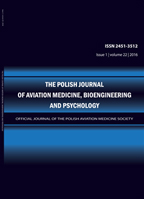2019, Volume 25, Issue 2
STRESS-COPING STYLES AND SATISFACTION WITH LIFE OF MILITARY AVIATION PERSONNEL DIFFERING IN BODY MASS INDEX
PAULINA BARAN1, PAWEŁ JAGIELSKI2, AGATA GAŹDZIŃSKA3
-------------------------------------------------------------------------------------------------
1Department of Psychophysiological Measurements and Human Factor Research, Military Institute of Aviation Medicine
2Department of Nutrition and Drug Research, Faculty of Health Science, Jagiellonian University, Medical College
3Laboratory of Dietetics and Obesity Treatment, Department of Psychophysiological Measurements and Human Factor Research, Military Institute of Aviation Medicine
Autor korenspondencyjny: AGATA GAŹDZIŃSKA; Laboratory of Dietetics and Obesity Treatment, Department of Psychophysiological Measurements and Human Factor Research, Military Institute of Aviation Medicine; email: agazdzinska@wiml.waw.pl
Full text
Streszczenie
Introduction: Soldiers, due to the specific nature of their service, are one of the occupational groups particularly exposed to stress. The aim of this study was to assess the stress-coping styles and satisfaction with life in a group of military aviation personnel, differentiated in terms of the BMI (Body Mass Index).
Methods: The research compared three groups of military aviation personnel, distinguished on the basis of BMI, i.e. people with normal body weight (25 people), overweight people (24 people) and people suffering from obesity (20 people). The CISS (Coping Inventory for Stressful Situations) Questionnaire by Endler and Parker was used to assess the stress-coping styles. Satisfaction with life was measured using the Satisfaction with Life Scale (SWLS) by Diener et al.
Results: The data analysis did not reveal any statistically significant differences in CISS and SWLS scores between groups differing in BMI (p>0.05). It was found that the style of coping with difficult situations that is most often manifested by the surveyed military aviation personnel is the task-oriented style (TOS). A comparable, high SWLS score was also revealed in all studied groups.
Conclusions: The BMI turned out not to be a factor differentiating either the type of stress-coping styles or the level of satisfaction with life experienced by the military aviation personnel studied. It is likely that, due to the specificity of soldiers' work, the TOS may be a beneficial and adaptive style of dealing with stressful situations. The high level of general satisfaction with life found in the surveyed members of the military aviation personnel provides a reason to conduct further research aimed at identifying the factors determining this variable.
Słowa kluczowe
stress, stress-coping styles, satisfaction with life, body weight, BMI, military aviation personnel
